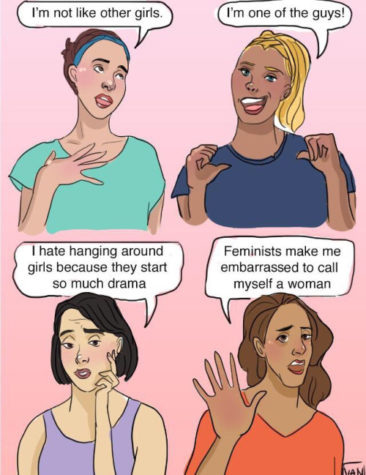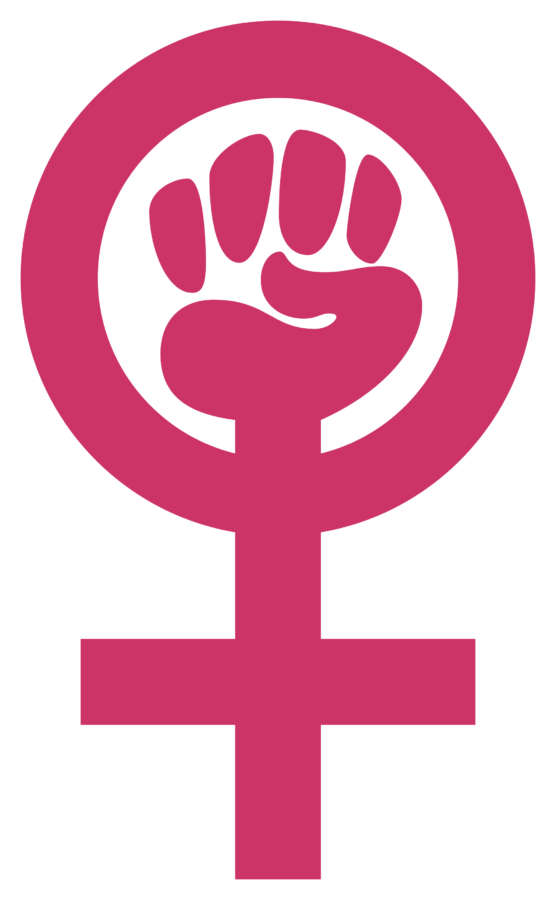There’s an “I” in “Internalized Misogyny”
March 13, 2017
Most of us know how awful misogyny is and how every day, as women, we fight constantly to defeat it. However, while the injustice and prejudice women face was clearly caused and is constantly fueled by men, women can very often play a role in our own oppression as well.
It is important to understand that this does not mean women automatically and outright believe they are the inferior gender (although some women do believe that) nor does it mean one is a bad person if they have played an unknowingly oppressive role in society. Internalized misogyny is one of the long-lasting results of constantly being surrounded by sexist notions; it causes women to shame, doubt, or undervalue themselves because of their gender or other people of the same gender, sometimes without even knowing it. We are forced to struggle within ourselves before we are able to fix the bigger issue at hand.
“But, how can I oppress myself or other women? Is that even possible? Isn’t it a bit reaching to say that I’m misogynistic if I dislike someone of the female gender? It’s normal to judge someone a little bit, we all do it. How can a woman oppress another woman if we’re all in the same boat?”
The questions above are very valid, but without knowing it, we all have participated in misogyny in various (and sneaky) ways.
- Superiority and Alienation
Believing you or a ‘select’ few are better than everyone else is the same thing as outwardly saying ‘I’m not like other girls.’ You inadvertently put down an entire gender in order to make yourself and others look better by saying that all women are the same (and it’s not in a good way if you feel the need to distance yourself away from the group). The notion puts women in a box and disables them from making their own choices out of fear that the choice they make will make them seem too ‘feminine’ or ‘girly’ or ‘basic.’ Just as feminism is a constantly evolving and changing thing, so are females: there is not one form. Phrases such as “Real Women _____” alienates and separates those who do not fit the description by saying that if you do not have these qualities, you are not a ‘real woman’ (which isn’t true). If you identify as a woman, a ‘real woman’ is whatever person you decide to be.
2. I’m Sorry, I’m Sorry, I’m Sorry, Did I Mention I’m Sorry?
Not all instances of misogyny are negative actions or thoughts towards other women. This example might be the most common out of all and even I fall victim to it more than I should. I always catch myself thinking everything is my fault or apologizing for the most nonsensical things. Ladies: not everything is your fault. You’re allowed to go through life proudly and unapologetically. Say sorry if you want to or if you know you are at fault for something. However, do not apologize because you feel that you are inferior or feel like you have to be sorry for something you can’t control (like your gender). Because you don’t.
3. “No to Bodies”
While we all hope that we don’t stimulate rape culture by blaming a victim of assault, shaming someone for having “an excessive amount of sexual desires” is more common, and just as bad. When you hear about a girl’s activity at a party and immediately think in your head that she has low standards and doesn’t respect herself, something needs to be fixed. We, as women, can objectify our own bodies by claiming that showing them or deciding to do something sexual with them would mean letting our oppressors win. Showing our bodies or embracing our sexuality has somehow become a bad thing and while it can cause others to feel like they don’t amount to people who are slimmer, thicker, or consequently ‘more desirable’ in society’s eyes, we can’t just tell people to shut down an integral part of who they are. Bodies, just like personalities, need to be understood and embraced rather than criticized and put in a box. What we decide to do with our bodies is a choice and showing or deciding to use it does not mean we do not respect it or ourselves.
In order to challenge the patriarchy, we need to recognize how it’s affected our thoughts and actions. In life, just embrace what makes you comfortable in your own skin and happy; similarly, don’t take away others’ road to happiness or self-empowerment by judging or devaluing it if you don’t agree with it. The only way to fight oppression is together, but we can’t do that if we internalize the hate and spread it ourselves. Then, we’re just doing the men’s dirty work for them and we are done doing their work.














